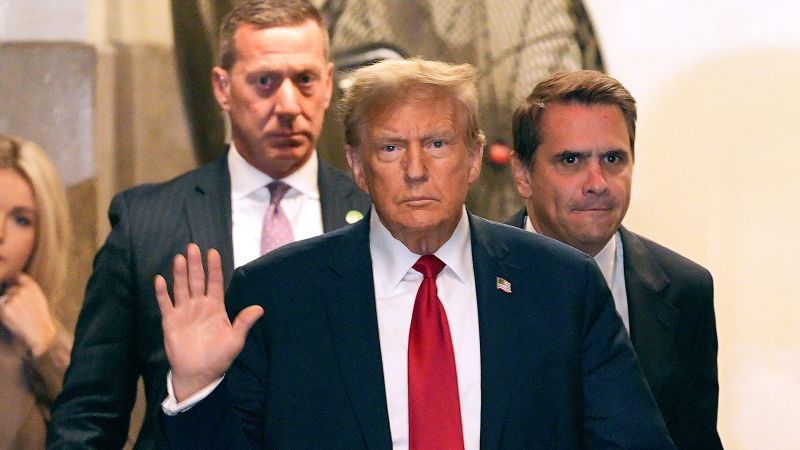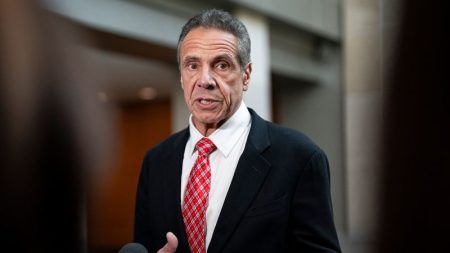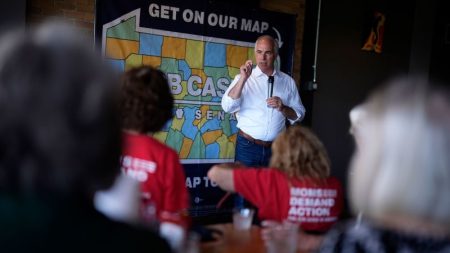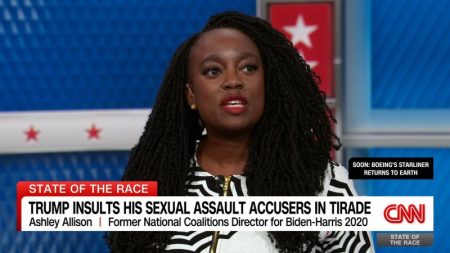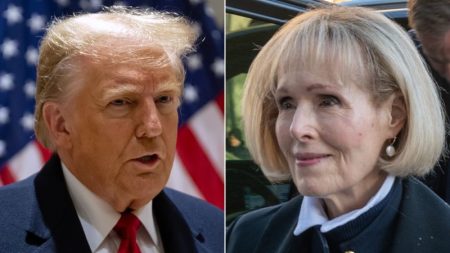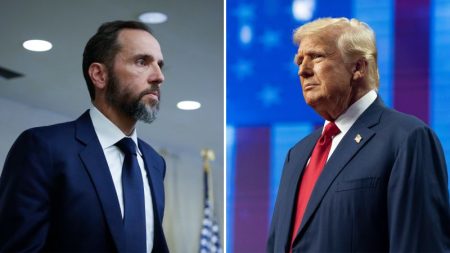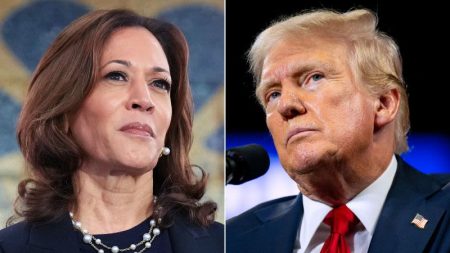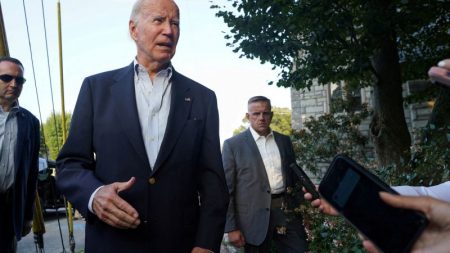Prosecutor Chris Conroy captured the quintessential Donald Trump in a single sentence at the ex-president’s hush money trial on Tuesday.
“He knows what he’s not allowed to do, and he does it anyway.”
Conroy was referring to Trump’s incessant testing of a gag order protecting witnesses, court staff and the jury. But there’s rarely been a better description of the presumptive GOP nominee’s entire approach to business and politics – or the way he’s promised to behave if voters send him back to the White House.
The New York lawyer coined his phrase during a tense hearing on whether Trump violated the terms of the gag order in social media blasts, reposts and comments claiming the jury was full of biased liberals and targeting two potential key witnesses, his ex-lawyer Michael Cohen and adult film star Stormy Daniels.
And in remarks in an interview recorded before Tuesday’s hearing but that was broadcast as Judge Juan Merchan considers whether to punish Trump, the ex-president was at it again. “Michael Cohen is a convicted liar and he’s got no credibility whatsoever,” Trump said in an interview with WPVI Philadelphia.
Only six days into the trial, Trump is doing what he always does, pushing the rules and conventions of the law and accepted behavior to service his own narrative of victimization he’s placed at the core of his 2024 campaign.
Prosecutors now want Merchan to fine Trump $1,000 for each of 10 alleged violations of the gag order and to warn that imprisonment could be an option if he continues to flout restrictions. CNN’s John Miller reported Tuesday that the Secret Service, court officers and the New York City Department of Corrections have quietly consulted on what to do if Trump ends up being jailed for contempt of court. That remedy remains a distant one for now, but any eventual step in that direction cannot be ruled out since no judge can allow a defendant to mock his authority in what is in essence a show of contempt for the rule of law.
“Judge Merchan has to have control of his courtroom,” former judge and current Cooley Law School professor Jeffrey Swartz told Jim Sciutto on CNN Max. “He cannot allow someone who is under a gag order to basically say, ‘I don’t care what you think, judge, I am going to do what I want to do.’”
It’s almost inconceivable that any other criminal defendant would get away with lacerating the judge and his court in the way that Trump has done on his Truth Social network, in interviews and in his remarks to cameras outside the court. Trump claims the gag order stifles his right to free speech and to campaign as a presumptive party nominee. But that is blatantly false: the order is narrow — even if it was extended by the judge to cover his family following social media attacks by the former president on Merchan’s daughter.
On Tuesday, Merchan grew visibly frustrated with Trump’s lawyers when they insisted that their client was trying hard to comply with the order, without offering any evidence. At one point, in what quickly turned into a disastrous hearing for Trump’s team, Merchan warned Trump’s attorneys they were “losing all credibility with the court.” Legal sketch artist Elizabeth Williams described the extraordinary moment when the judge clashed with Trump’s counsel Todd Blanche. “Merchan is a pretty cool character, he doesn’t get easily riled up,” she told CNN’s Erin Burnett. “They were going at it.”
Trying, and failing, to hold Trump to account
Merchan, like most judges, may not be used to such affronts. But he’s the latest in a long line of judges, public officials, political aides and business associates — not to mention US laws and the Constitution — to try to constrain the former president. And while a dispute over one partial gag order might seem like a small wrinkle in an individual case, it conveys a wider truth about Trump’s impact on American life.
There’s a common theme in all Trump’s four criminal cases, other legal quagmires and the single presidential term that produced two impeachments: He constantly refuses to comply with laws that apply to every other American.
The implicit underpinning of all Trump’s pending trials – including two over his attempt to overturn the 2020 election, one over his hoarding of classified documents and other civil and fraud cases – is the same. It’s that every American is equal in the eyes of the law – a principle that even applies to ex-presidents.
But Trump constantly infringes this bedrock value that is the pillar of the legal system. And he will do so in the most audacious of ways on the biggest stage later this week when the US Supreme Court hears his sweeping claim that ex-presidents are immune from prosecution for acts they committed in office. The argument is an attempt to derail special counsel Jack Smith’s stalled federal election interference case against Trump. The former president posted on Truth Social on Sunday: “Without Presidential Immunity, a President will not be able to properly function, or make decisions.”
But Trump is reaching for protections that would absolve the executive office of the presidency of legal accountability for criminal acts — a privilege that no other commander in chief in nearly two-and-a-half centuries has enjoyed and which appears to contradict the founding principles of a nation that rebelled against a monarch who was above the law. Most legal scholars believe there’s no merit to his claims — a stance validated by a court of appeals ruling against Trump in Washington, DC. But any decision by the Supreme Court to suggest even some limited areas of presidential immunity could end up changing the scope of the office itself.
This sense that Trump feels he’s not covered by the same rules as everyone else shines through all of his legal cases – in which he’s pleaded not guilty – as well as his other escapades.
• He’s the first president in history to lose an election but insist that he won based on false and debunked claims of mass fraud.
• He saw nothing wrong, as president, with phoning officials in Georgia and asking them to “find” votes that did not exist so he could try to overturn President Joe Biden’s win in the critical swing state in 2020. The ex-president insisted the call was “perfect” — the same phrase he used to describe his attempt to coerce Ukrainian President Volodymyr Zelensky into announcing an investigation into the Biden family in a conversation that led to his first impeachment.
• The impulse to ignore gag orders and most accepted understandings of the limits of presidential power seems to spring from the same contempt for the rule of law that led Trump to allegedly mishandle troves of classified documents at his Mar-a-Lago estate and to claim they belonged to him and not the country. He’s also awaiting trial in this case in which he’s pleaded not guilty.
• A sense that the law only applies to other people may have also informed the ex-president’s overvaluing of his properties to secure preferential treatment from banks and insurance firms — an assumption countermanded by his loss in a near half-a-billion dollar civil fraud trial judgement against him, the Trump Organization and his adult sons earlier this year.
While Trump’s obliviousness to constraints horrifies his opponents, his willingness to tear down legal and political institutions is the key to his appeal to millions of supporters.
In his bid to win back the White House, Trump is appealing to Americans who distrust governing elites in politics, the law, the medical establishment and the media. He’s posing as a champion who is enduring persecution so that they won’t have to. “I am your justice … and for those who have been wronged and betrayed, I am your retribution,” Trump said at the Conservative Political Action Conference in March 2023, reviving his bond with his populist base voters.
But Trump’s willingness to trample the law and the principles of a democratic, constitutional system has severed his links with more traditional conservatives. George Conway, a conservative lawyer who before 2020 always voted for Republicans for president, will headline a fundraiser for Biden on Wednesday and will give nearly a million dollars to a joint fundraising committee to try to reelect him because he’s worried about Trump’s pledge to devote his possible second term to retribution. He warned Trump “doesn’t care a whit about the Constitution, about the rule of law. He wants to undermine the country and its rule of law for his own political purposes.”
Conway, who was in court for the Trump trial on Tuesday, became emotional as he explained his decision to donate the maximum amount possible in an interview with CNN’s Burnett.
“Yeah, it’s going to come out of my kids’ inheritance, but the most important thing they can inherit is living in a constitutional democracy,” Conway said.
Read the full article here
